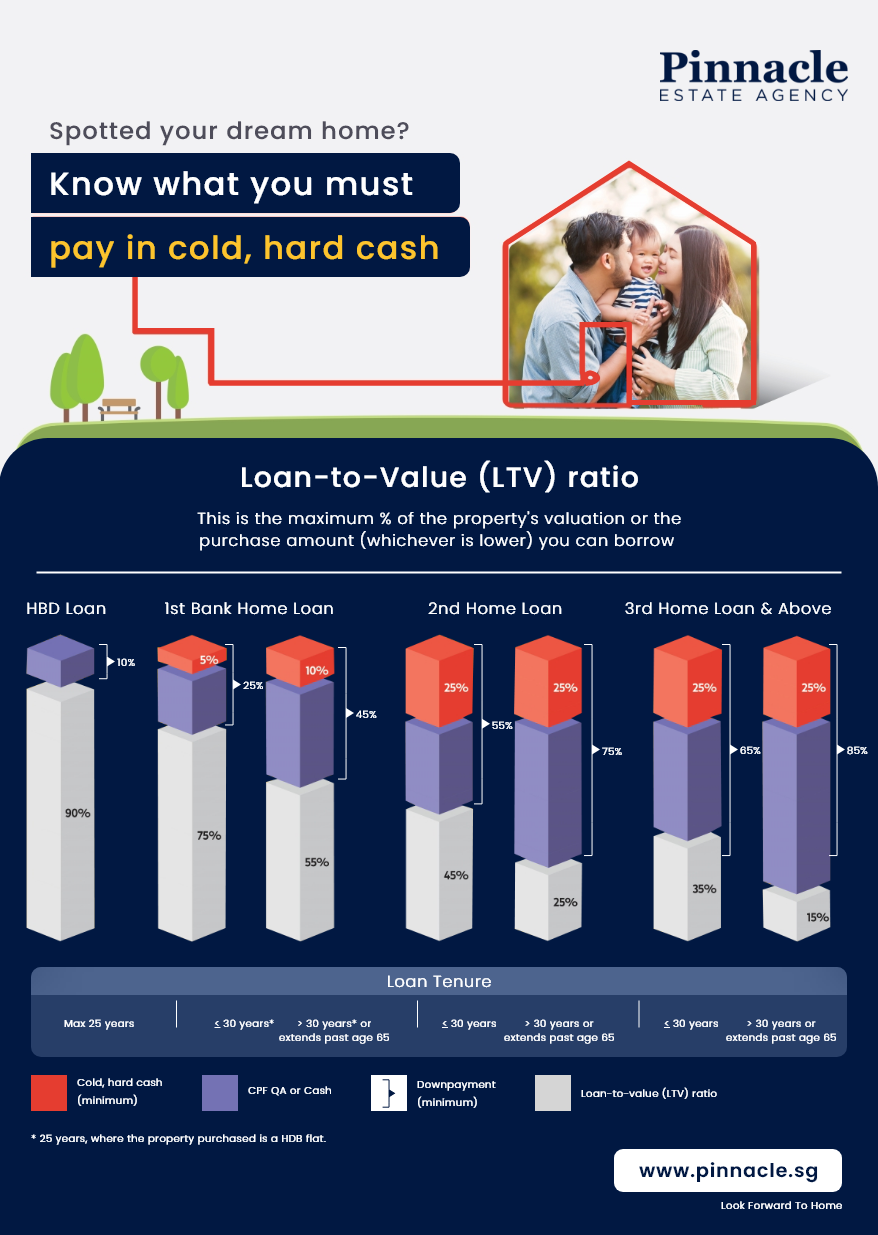Loan-to-Value Ratio (LTV) for Mortgage Loans: Everything You Need To Know
This article discusses the overview of Loan to Value (LTV) Ratio, factors affecting LTV Ratio, and the difference in LTV for HDB Loan and Bank Loan
If you are buying a property in Singapore, you will likely need a loan from HDB or Bank to finance the purchase. However, you cannot borrow any amount you want as there are limits based on the Loan-to-Value (LTV) ratio. The Singapore government has these restrictions in place, putting a ceiling on the amount of money property buyers are allowed to borrow from either HDB or banks.
The LTV is what determines how much you can borrow, and therefore how much of a down payment in cash and/or from your CPF Ordinary Account (CPF OA) that you must pay upfront. These limits apply for home loans taken out to finance the property, no matter if it’s the buyer’s first home mortgage, second, or 100th.
The information in this article will help you understand the government’s reasoning behind these restrictions, and the various LTVs used for getting HDB and bank loans.
Table of Contents
Overview of Loan-to-Value Ratio (LTV)
Loan-to-Value (LTV) Ratios Explained
Overview of Loan-to-Value Ratio (LTV)
|
What is LTV? |
The maximum percentage of the value of the property you are allowed to borrow to finance for the property purchase. |
|
HDB Loan |
You can borrow up to 85% of the purchase price/property value, whichever is the lower amount |
|
Bank Loan |
You can borrow up to 75% of the purchase price/property value for your first loan, whichever is the lower amount |
|
Factors that may impact your LTV |
The property's location, lease, and condition, as well as your age and credit ratings |
Loan-to-Value (LTV) Ratios Explained
Basically, the LTV ratio is the percentage amount of money of the value of the property that the government will allow you to borrow to finance the purchase of a home. For example, if your LTV ratio is 75% you are able to borrow up to 75% of the purchase price or of the property’s valuation (whichever is lower).
The purpose of implementing the LTV ratio is to prevent borrowers from becoming over-leveraged. If you can’t decide whether to get an HDB loan or a bank loan, you should read this article to know the differences between the two.
For new property launches, like new HDB units (BTOs), new launch condos and new executive condos, the LTV ratio is always based on the purchase price.
When buying a resale property for an amount over its HDB/bank valuation, you must pay the Cash Over Value (COV) amount in cash. For example, if you buy a property that’s valued at $600,000 but you pay $650,000 for it, the LTV will be based on its value of $600,000, so you will have to pay the additional $50,000 in cash.
LTV Ratios in Singapore
There is a major difference in HDB housing loans vs. bank loans when it comes to the LTV ratio.
Up to 85% LTV for HDB Housing Loans
The HDB Concessionary Loan (HDB housing loan), which is available only for buying BTOs, Resale Flats, Sale of Balance Flats, and Re-offer of Balance Flats has a maximum of 85% Loan-to-Value (LTV) ratio. This means that buyers can borrow up to 85% of the property’s purchase price or value, whichever is lower. They would then need to make a down payment of 10%.
Buyers can make their down payment in cash or withdraw funds from their CPF OA, or a combination of both. The cash component doesn’t have a minimum. If you qualify to receive any CPF Family Housing Grants, Enhanced Housing Grants, and/or Proximity Housing Grants, the grant amount can be used to pay for the down payment, legal fees, and Stamp Duty fee.
Because people are only allowed to own one HDB flat at a time, and therefore only need one HDB housing loan, there will be no LTV for second HDB loans.
Up to 75% LTV for Bank Loans
If you are applying for a bank loan, the LTV ratio tops out at 75% for your first loan (as long as you don’t have any outstanding home loans). Regarding the 25% balance, 5% has to be paid in cash with the 20% remaining paid in cash or from your CPF OA account.
In July 2018, the 80% LTV for Bank Loans was Lowered to 75%
In July 2018, the Singapore government decided that the 80% LTV for bank loans had to be tightened to 75% in an attempt to cool down the property market.
A Comparison of LTVs for HDB Housing Loans vs. Bank Loans
The infographic below provides a snapshot of the latest LTV ratio for purchasing property in Singapore. The LTV ratio is subject to a loan tenure and the borrower’s age when the loan tenure ends is also a factor. If you are getting your second or third home mortgage from a bank, there will be tighter LTVs as well.


Note: There are situations in which you may not be qualified for the maximum LTV.
You need to know that HDB/banks are under no obligation to lend you the maximum LTV amount. They can approve you at a lower LTV, or even reject your application. If you have found yourself in this situation, the following reasons may be why:
1. There may be too little time remaining on the property’s lease
Leasehold properties with only 30 or 40 years remaining on the lease may be subject to a 60% LTV ratio. This is because banks believe that properties with diminishing leases do not offer as much collateral due to their dwindling market value.
There may be exceptions to this in which properties are bought with monthly payments, or the buyer still obtains a loan despite the property’s age. In these cases, the buyer has privately negotiated a contract with the seller through their lawyers. Or a private bank approves a special loan to a wealthy buyer who happens to have an excellent credit history, and pledge certain amount in the fixed deposits with the bank.
2. The property is poor condition and located in a bad area
Based on the condition of the property and where it’s located, the LTV on it can be lowered a lot. Properties overseas often get lower LTV caps and properties in a high-crime area and red light districts such as Geylang usually either get a lower LTV ratio or unable to obtain a loan approval.
The lender will likely check for lawsuits or liens on properties as well. Properties with years of deferred maintenance and/or major defects are likely to get a lower LTV ratio.
3. The loan tenure is too high, and you are up in years
As seen on the infographic above, if the loan tenure on the property you want to buy goes past your age of 65, the LTV ratio is going to be capped. In cases in which the loan tenure is over 30 years, the LTV will also be capped.
If you are 35 years of age and considering taking out a home loan, you will be required to repay the entire loan before you reach 65 if you want a higher LTV ratio. For this very reason, many buyers plan on buying their second property once they’ve saved up enough money.
4. You have poor credit ratings
If your credit history shows that you’ve made late payments and defaulted on loans, you will likely be flagged as a poor credit risk. Banks may offer you a lower LTV than would otherwise be allowed for this reason. People with poor credit can expect a 60% LTV rather than 75% for their first bank loan. You can obtain a copy of your credit rating from Credit Bureau Singapore.
At Pinnacle Estate Agency, we strongly believe in sharing our real estate knowledge to the public. For more content like this article, check out our Singapore Property Guides.









